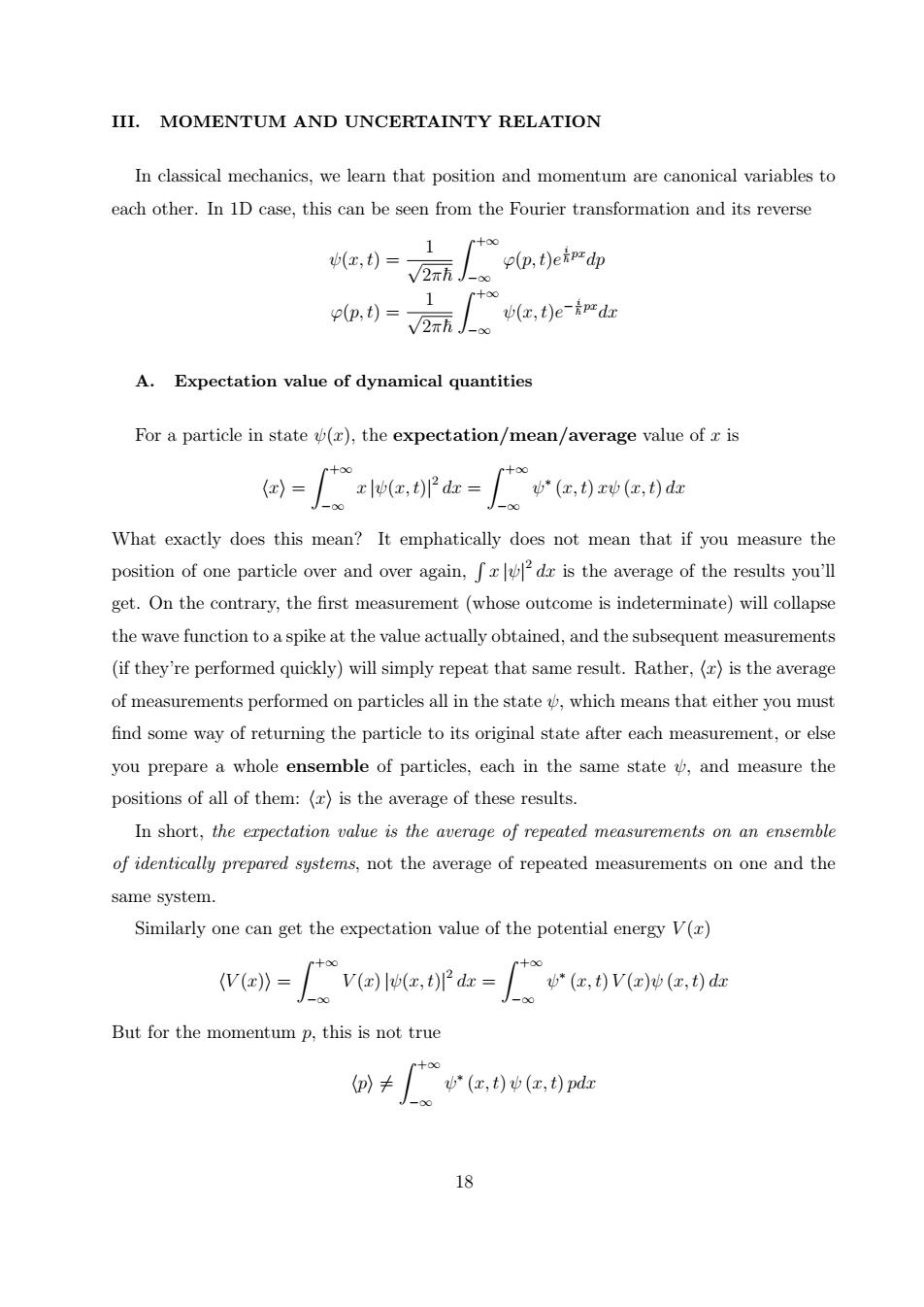正在加载图片...

III.MOMENTUM AND UNCERTAINTY RELATION In classical mechanics,we learn that position and momentum are canonical variables to each other.In 1D case,this can be seen from the Fourier transformation and its reverse 1 [too (x,)= pp,t)e严d 1 pp,)=2x元J- (a,t)e-严dr A.Expectation value of dynamical quantities For a particle in state (r),the expectation/mean/average value of r is =广te,rP在=eG0we,0血 What exactly does this mean?It emphatically does not mean that if you measure the position of one particle over and over again,dr is the average of the results you'll get.On the contrary,the first measurement(whose outcome is indeterminate)will collapse the wave function to a spike at the value actually obtained,and the subsequent measurements (if they're performed quickly)will simply repeat that same result.Rather,()is the average of measurements performed on particles all in the state which means that either you must find some way of returning the particle to its original state after each measurement,or else you prepare a whole ensemble of particles,each in the same state and measure the positions of all of them:(is the average of these results. In short,the erpectation value is the average of repeated measurements on an ensemble of identically prepared systems,not the average of repeated measurements on one and the same system. Similarly one can get the expectation value of the potential energy V() we》=vae,Pz=e,voee在 But for the momentum p,this is not true 创≠(z,),r 18 III. MOMENTUM AND UNCERTAINTY RELATION In classical mechanics, we learn that position and momentum are canonical variables to each other. In 1D case, this can be seen from the Fourier transformation and its reverse ψ(x, t) = 1 √ 2π~ Z +∞ −∞ ϕ(p, t)e i ~ pxdp ϕ(p, t) = 1 √ 2π~ Z +∞ −∞ ψ(x, t)e − i ~ pxdx A. Expectation value of dynamical quantities For a particle in state ψ(x), the expectation/mean/average value of x is hxi = Z +∞ −∞ x |ψ(x, t)| 2 dx = Z +∞ −∞ ψ ∗ (x, t) xψ (x, t) dx What exactly does this mean? It emphatically does not mean that if you measure the position of one particle over and over again, R x |ψ| 2 dx is the average of the results you’ll get. On the contrary, the first measurement (whose outcome is indeterminate) will collapse the wave function to a spike at the value actually obtained, and the subsequent measurements (if they’re performed quickly) will simply repeat that same result. Rather, hxi is the average of measurements performed on particles all in the state ψ, which means that either you must find some way of returning the particle to its original state after each measurement, or else you prepare a whole ensemble of particles, each in the same state ψ, and measure the positions of all of them: hxi is the average of these results. In short, the expectation value is the average of repeated measurements on an ensemble of identically prepared systems, not the average of repeated measurements on one and the same system. Similarly one can get the expectation value of the potential energy V (x) hV (x)i = Z +∞ −∞ V (x)|ψ(x, t)| 2 dx = Z +∞ −∞ ψ ∗ (x, t) V (x)ψ (x, t) dx But for the momentum p, this is not true hpi 6= Z +∞ −∞ ψ ∗ (x, t) ψ (x, t) pdx 18